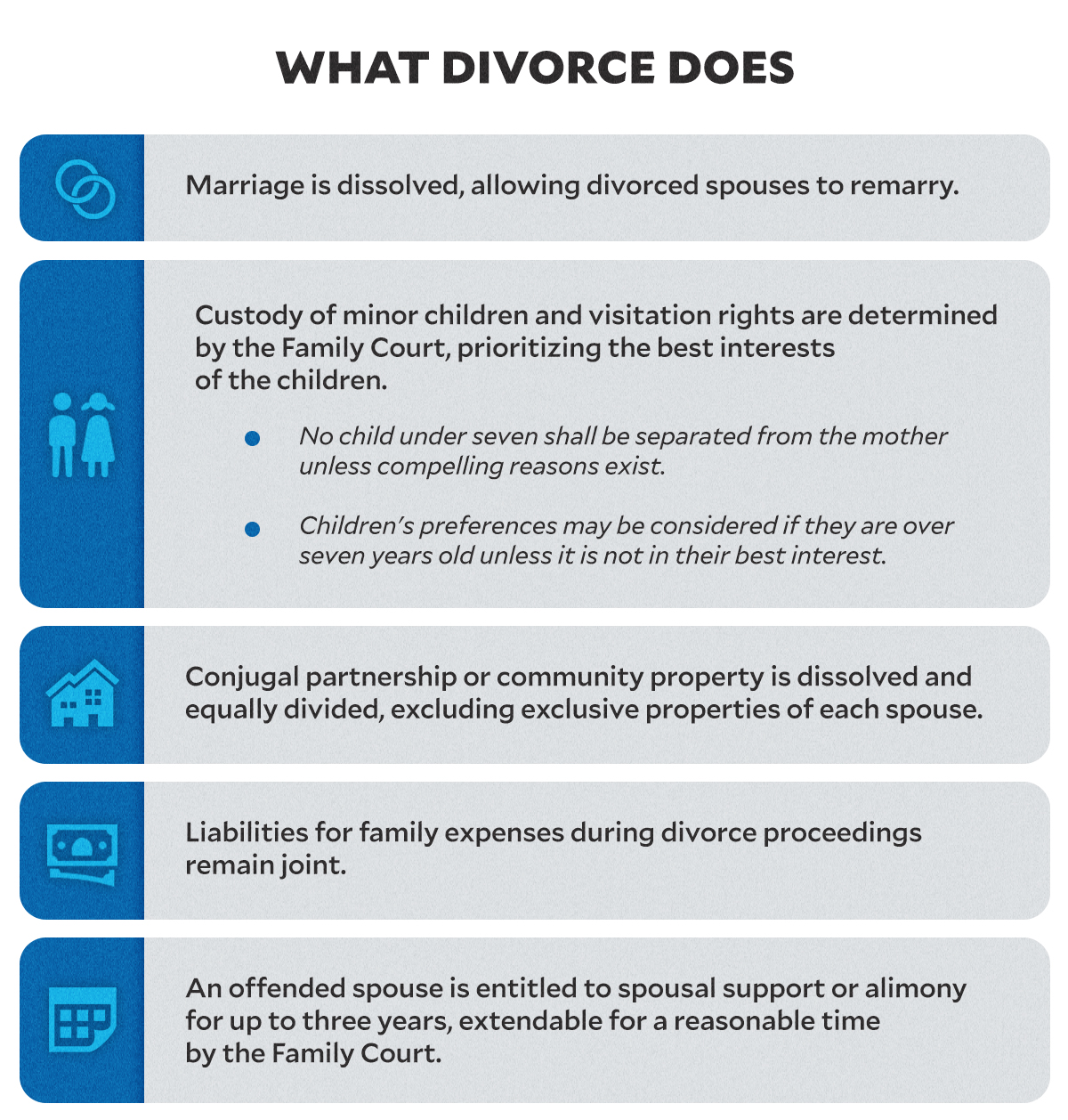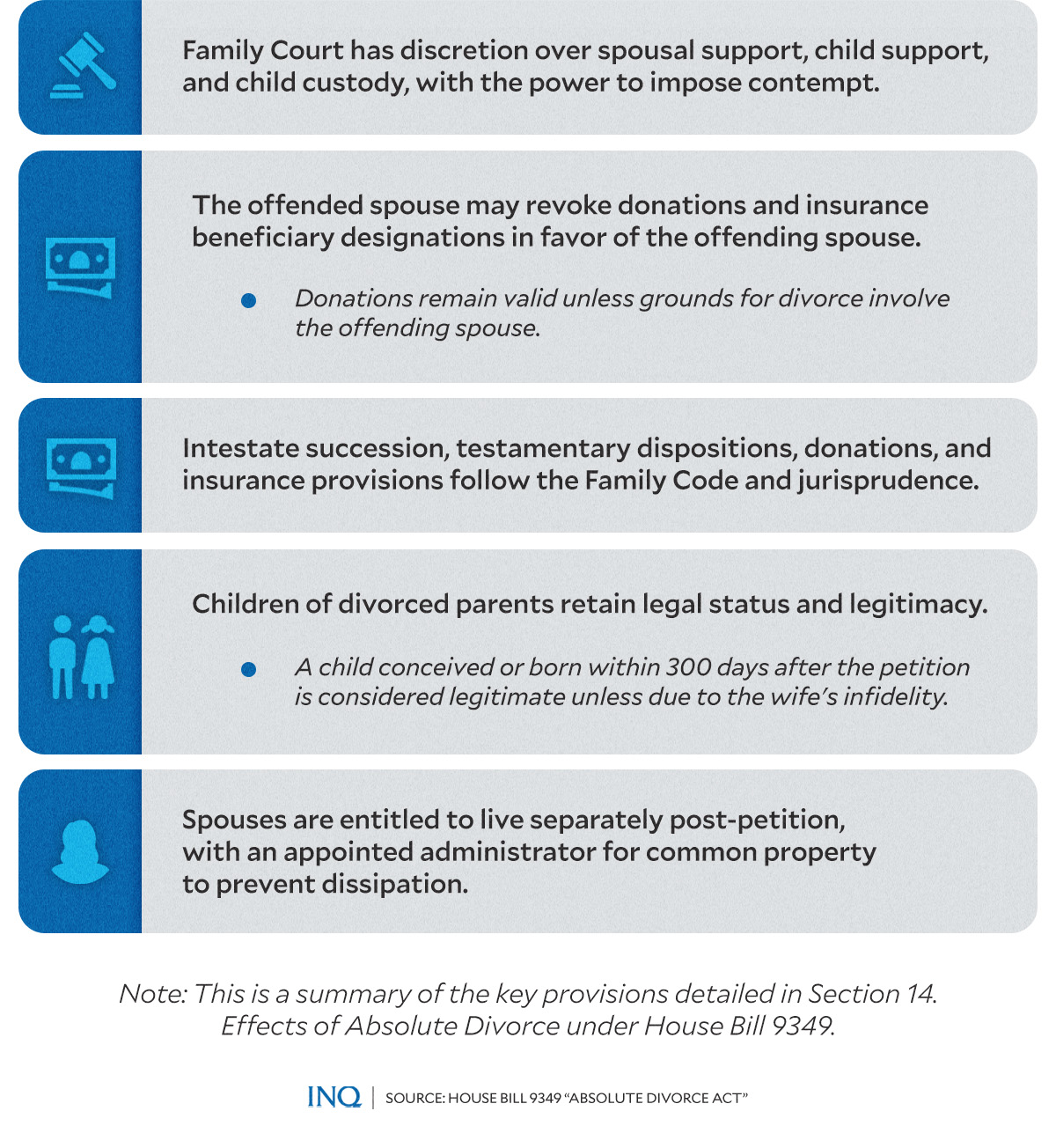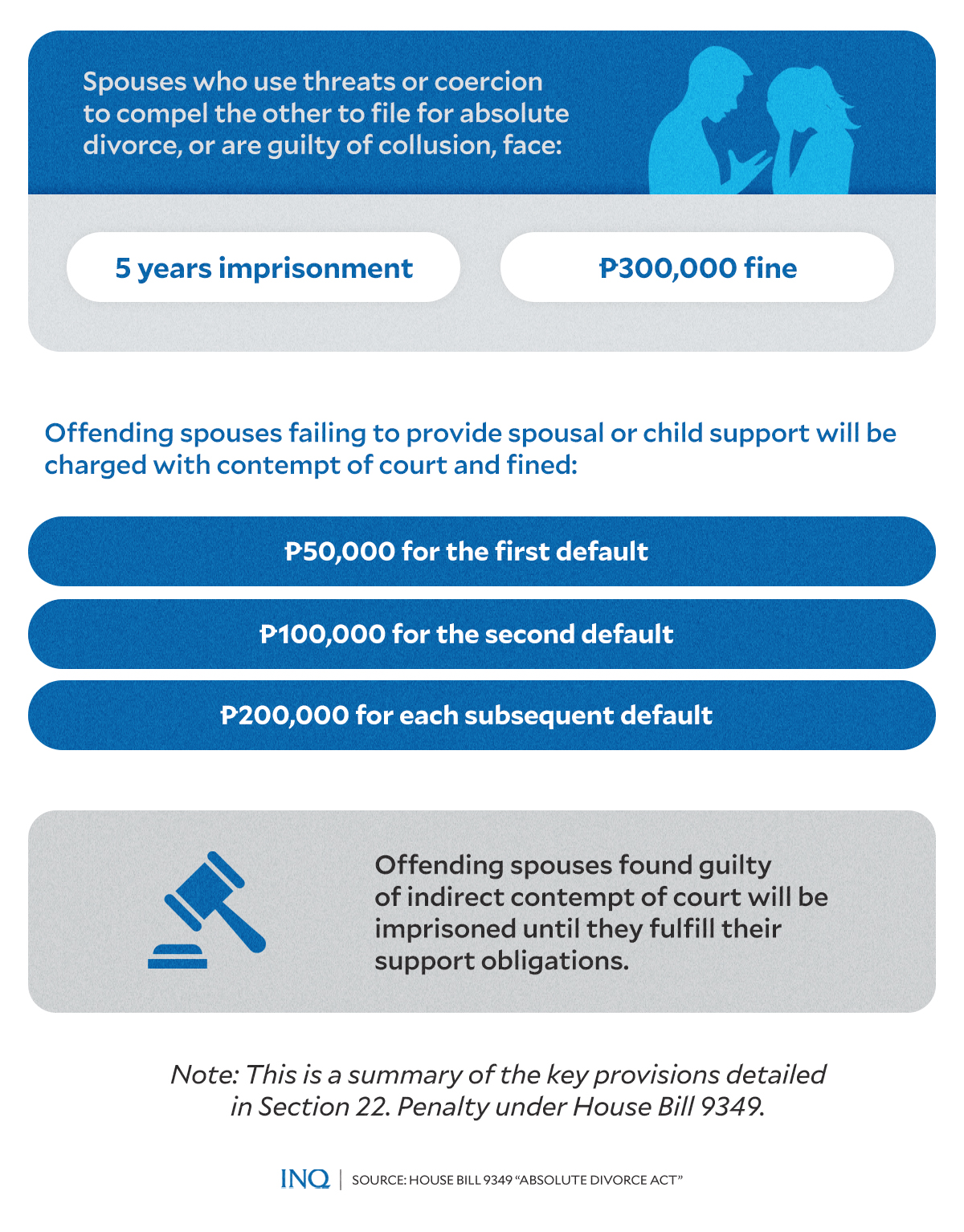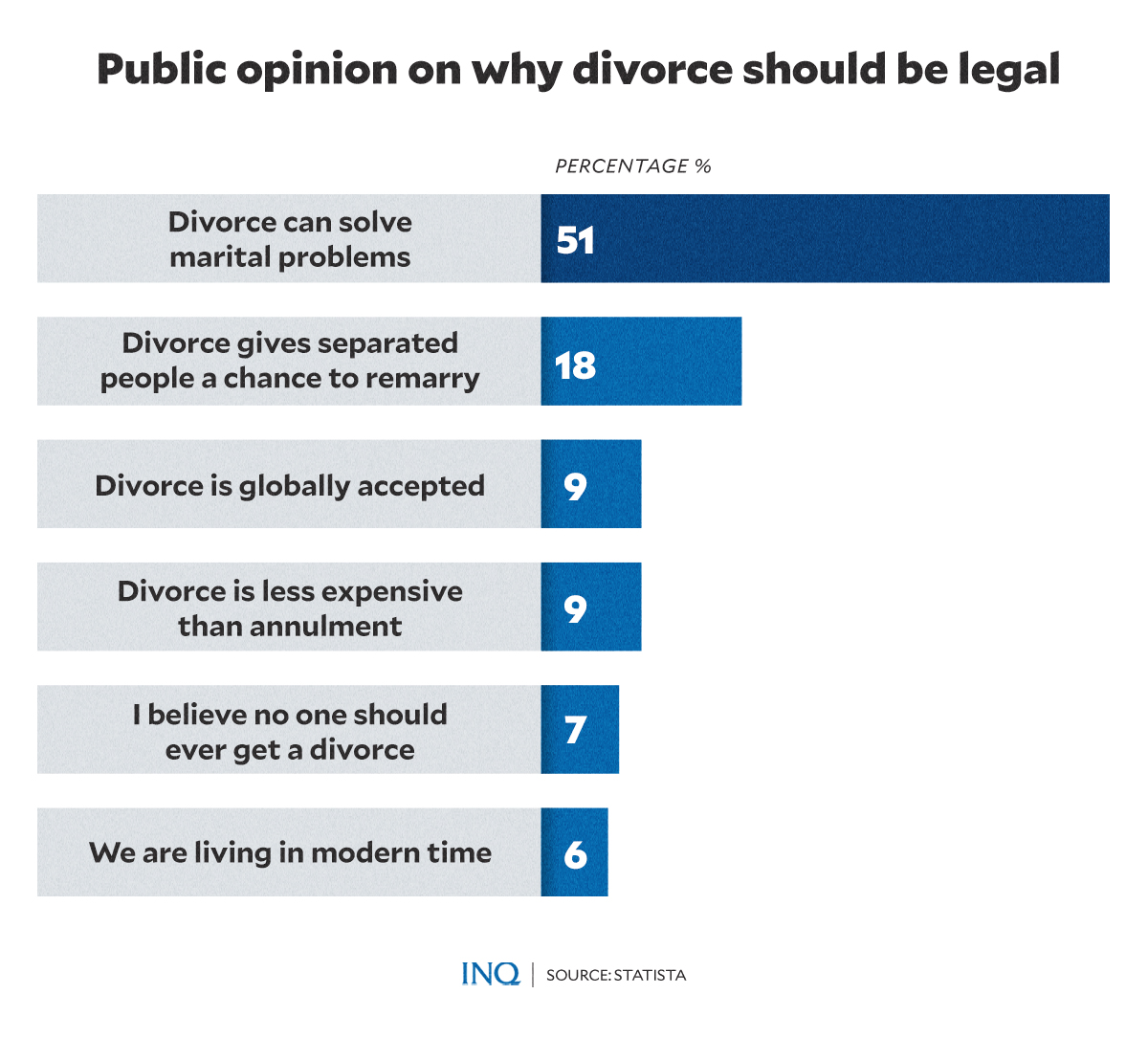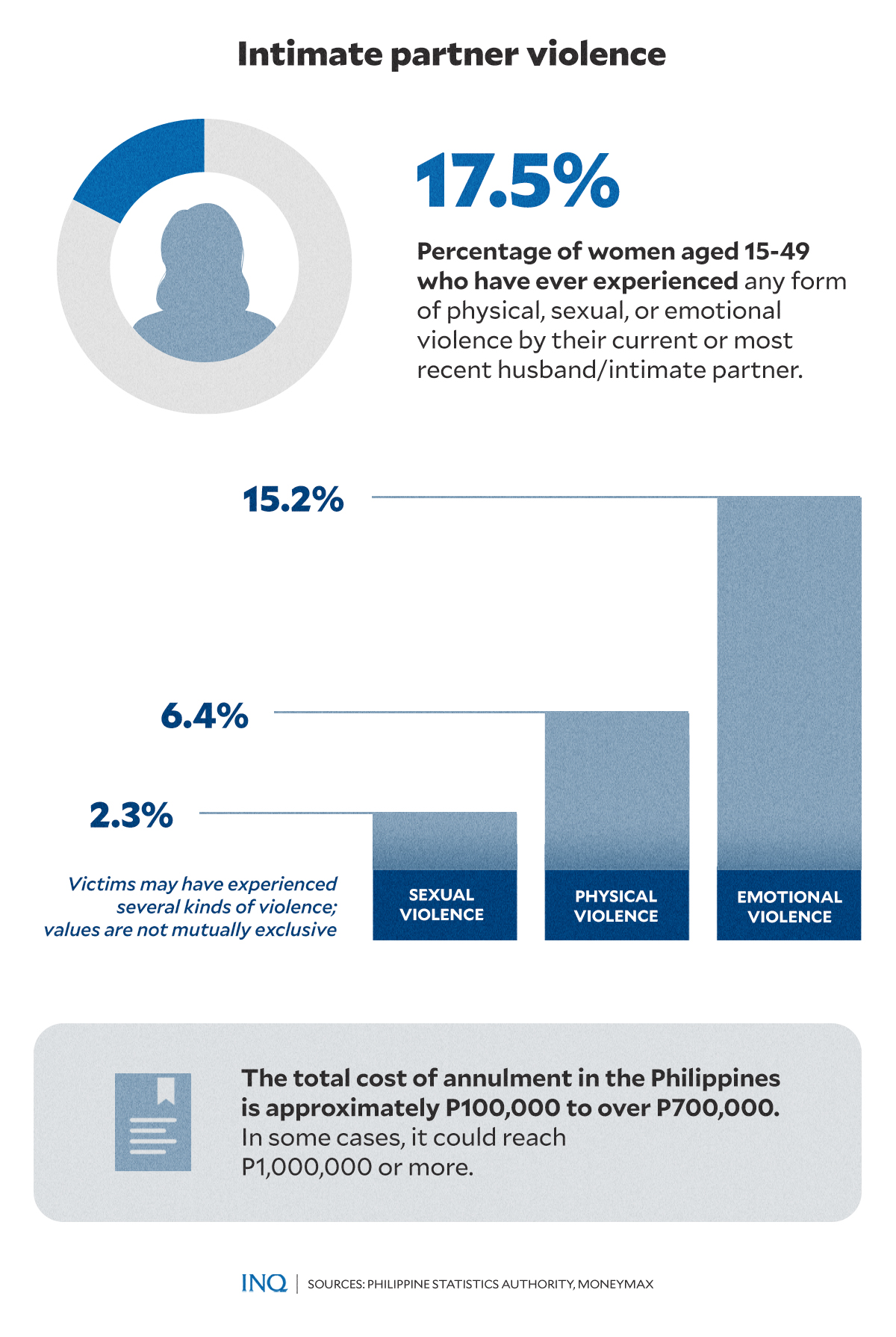Divorce: ‘Not for everyone’
MANILA, Philippines—In a historic legislative move, the House of Representatives has passed House Bill (HB) 9349, also known as the “Absolute Divorce Act,” which aims to allow absolute divorce as a legal recourse for Filipino couples trapped in irreparably broken marriages.
For the longest time, the Philippines, where 80 percent of the population is Catholic, is known as the only country in the world — other than the Vatican — where divorce remains illegal.
For pro-divorce advocates in the Philippines, the absence of divorce as a legal option significantly hinders couples from severing ties and, most crucially, escaping violent and abusive relationships.
Although couples seeking to end their marriage can try annulment or declaration of marriage invalidity from courts, the process is slow and costly — starting from at least P100,000 — with no guaranteed outcome.
If the marriage was solemnized in church, the process of annulment could take even decades.
Article continues after this advertisementIn some cases, couples who are desperate for quicker resolutions fall victim to online scams. Other couples, meanwhile, opt to live separately while remaining legally bound in long-dead marriages.
Article continues after this advertisementA group of various lay Catholic organizations has previously argued that the lack of divorce in the Philippines “doesn’t mean we should also allow it.”
The Catholic Bishops’ Conference of the Philippines (CBCP) has long maintained that divorce is “anti-family, anti-marriage, and anti-children.”
Despite these arguments, in a 131-109-20 vote, the House of Representatives approved on third and final reading the proposed Absolute Divorce Act, a bill allowing absolute divorce in the country.
READ: House approves divorce bill on final reading
READ: House revises ‘yes’ vote on divorce bill’s approval to 131 from 126
The last time a House divorce bill hurdled final reading was in the 17th Congress, during the first half of former President Rodrigo Duterte’s administration.
However, the measure languished in the Senate.
The current Senate version of the divorce bill, filed by Senators Risa Hontiveros, Raffy Tulfo, Robin Padilla, Pia Cayetano, and Imee Marcos, has already been approved at the committee level last year.
What is the divorce bill all about?
Section 2 of the proposed Absolute Divorce Act states that while the government continues to value and protect marriage, it also provides a way for couples in “irreparably failed marriages” to get a divorce.
It stressed that the measure aims to help children avoid the stress of their parents’ constant fighting and gives divorced individuals the chance to remarry.
Under the Absolute Divorce Act, the following are considered grounds for absolute divorce:
- Physical violence or grossly abusive conduct directed against the petitioner, a common child, or a child of the petitioner.
- Physical violence or moral pressure to compel the petitioner to change religious or political affiliation.
- Attempt of the respondent to corrupt or induce the petitioner, a common child, or a child of the petitioner, to engage in prostitution or connivance in such corruption or inducement.
- Final judgment sentencing the respondent to imprisonment of more than six (6) years, even if pardoned.
- Drug addiction, habitual alcoholism, or chronic gambling of the respondent
- Homosexuality of the respondent.
- Contracting by the respondent of a subsequent bigamous marriage, whether in the Philippines or abroad.
- Marital infidelity or perversion or having a child with another person other than one’s spouse during the marriage, except when upon the mutual agreement of the spouses, a child is born to them through in vitro fertilization or a similar procedure or when the wife bears a child after being a victim of rape.
- Attempt by the respondent against the life of the petitioner, a common child or a child of the petitioner.
- Abandonment of petitioner by respondent without justifiable cause for more than one (1) year.
- When the spouses are legally separated by judicial decree for more than two (2) years, either spouse can petition the proper Family Court for an absolute divorce based on said judicial decree of legal separation.
The proposed Absolute Divorce Act not only allows spouses in hopelessly broken marriages to obtain a divorce through judicial procedures, but also addresses several key aspects:
- Includes provisions to ensure the best interests of children are protected, including care, custody, and support.
- Supports women’s rights by helping them escape abusive relationships and regain their dignity and self-esteem.
- Ensures that divorce proceedings are affordable and quick, especially for those needing court assistance.
- Introduces a sixty-day period for reconciliation efforts, except in cases involving violence.
- Recognizes valid foreign and church divorces without requiring additional legal processes.
- Provides court-appointed social workers, psychologists, and legal counsel to assist petitioners.
- Requires the Department of Social Welfare and Development (DSWD) to implement programs that strengthen marriage and family life.
What the divorce bill is not about
The proposed Absolute Divorce Act does not eliminate marriage; rather, it seeks to protect and preserve marriage while providing a remedy only for failed marriages, especially those that involve domestic or marital abuse.
While it offers divorce or legal separation as options for irreparably broken marriages, it does not promote divorce as the first choice. Section 12 of HB 9349 mandates a 60-day cooling-off period, during which the Family Court must make every effort to reunite and reconcile the spouses after the filing of the divorce petition.
“Upon expiration of the cooling-off period without the parties having reconciled, the court shall immediately commence trial and is mandated to decide the petition within one (1) year after the lapse of the sixty-day cooling-off period,” Section 12 of HB 9349 stated.
However, the cooling-off period does not apply in cases that involve acts of violence against women and their children (VAWC) under Republic Act No. 9262 or when there is an attempt against the life of the other spouse, a common child, or the petitioner’s child. It is also not required for petitions filed under summary judicial proceedings.
The proposed Absolute Divorce Act also ensures that divorce is:
- Not instant or automatic since it requires proper judicial proceedings and compliance with legal protocols.
- Attentive to children’s needs and ensures that the children’s rights and interests are protected during and after divorce.
- Not free for all. It ensures that the grant of absolute divorce is affordable and fees are waived only for court-assisted petitioners who qualify.
- Legally supervised to prevent collusion and coercion in divorce filings.
- Not disregarding property rights, ensuring the division and protection of conjugal properties and children’s inheritances.
In a statement, Albay Rep. Edcel Lagman, the author of HB 9349, assured critics that a divorce law would not destroy marriages, emphasizing that divorce does not sever a marriage that has already long been dead.
“What will be before the Family Court is a cadaver of a marriage,” he said.
“Divorce is not the monster plaguing a marriage. It is marital infidelity, abandonment, violence, and cruelty, among others, which are the devils that destroy marriages,” he added.
Filipinos’ view on legalization of divorce
A 2017 survey by Social Weather Stations (SWS) revealed that five in 10 Filipinos believe that separated and irreconcilable married couples should be allowed to divorce and remarry.
The survey asked respondents whether “married couples who have already separated and cannot reconcile anymore” should be allowed to divorce “so that they can get legally married again.”
Of those surveyed, 53 percent agreed with the statement, with 30 percent saying they “strongly agree” and 23 percent “somewhat agree.” On the other hand, 32 percent disagreed, including 10 percent who “somewhat disagree” and 22 percent who “strongly disagree.”
Data from SWS also indicated a significant increase in the percentage of Filipinos who support making divorce legal for married couples unable to reconcile.
In 2005, 43 percent of adults (24 percent strongly agree, 19 percent somewhat agree) supported this idea. By 2011, this had risen to 50 percent (27 percent strongly agree, 23 percent somewhat agree).
The trend continued upward, peaking in 2014 with 60 percent (38 percent strongly agree, 22 percent somewhat agree). Though there was a slight decline in 2015 to 48 percent, support remained strong, with 53 percent in 2016 and 53 percent in 2017.
READ: Filipinos demand right to divorce: ‘We want to break free’
According to data from Statista, Filipinos, when surveyed, highlighted several reasons for supporting the legalization of divorce in the Philippines. These reasons include:
- 51 percent believe divorces can solve marital problems.
- 18 percent think divorce gives separated individuals a chance to remarry.
- 9 percent notes that divorce is globally accepted.
- 9 percent find divorce to be less expensive than annulment.
- 6 percent argue that we are living in modern times, implying the need for updated laws.
The data also indicated that 7 percent of surveyed Filipinos believe that no one should ever get a divorce.
‘Anti-family, anti-marriage, anti-children’
In a statement, the CBCP expressed disappointment over the House of Representatives’ approval of the divorce bill. Bishop Alberto Uy of Tagbilaran emphasized that divorce undermines the sanctity of marriage, calling it “a sacred covenant.”
Fr. Jerome Secillano, executive secretary of the bishops’ Episcopal Commission on Public Affairs, added that “divorce is anti-family, anti-marriage, and anti-children” and criticized Congress for betraying its constitutional mandate to uphold marriage and family.
He also noted that existing legal remedies for separation already exist and argued that “divorce is not the ultimate solution to problematic unions.”
Similarly, Cibac Rep. Eddie Villanueva, a born-again pastor who voted against the bill, pointed out that annulment and legal separation provide ways to address troubled marriages without defying religious beliefs.
“We should have realized that annulment and legal separation exist to remedy problematic marriages without rebelling against God, insulting Him, and drawing the curses of disobeying Him,’’ he said.
READ: House OKs divorce bill: ‘No monster’
Manila Rep. Bienvenido Abante noted that the Philippines is “becoming a liberal country like America.”
“I just hope that this divorce bill will be something that cannot be taken advantage of by some people. We don’t want this bill to become a tool (to destroy marriages),” Abante said.
Addressing concerns about the measure, ACT Teachers Rep. France Castro stressed that the bill “would not destroy the sanctity of marriage”. Rather, it acknowledges that “some marriages just simply get to a point where it becomes irreparable.”
Divorce as a ‘life raft’
According to Lagman, the measure is not meant for everyone, as the vast majority of Filipino marriages are happy, lasting, and loving. These couples, he said, do not need the divorce law.
Castro explained that the measure provides a “much-needed option for women and families trapped in broken marriages, particularly those involving violence.”
According to the Philippine Statistics Authority, approximately one in six Filipino women aged 15-49 have experienced physical, sexual, or emotional violence from their current or most recent husband or intimate partner.
READ: It takes a village VAW desk: Her days of abuse can stop here
“It is easy to paint Filipino families as perfect, devoid of any form of conflict and abuse. But in reality, political, economic, and social realities strain marital relationships,” said Gabriela Rep. Arlene Brosas.
“Many women face inequalities and violence that undermine the ideals of marriage,” Brosas continued.
Dr. Anna Cristina Tuazon, a psychologist and associate professor at the University of the Philippines (UP) Diliman, believes that divorce isn’t what destroys happy marriages. Instead, it serves as a life raft for those trapped in marriages that have long been dead.
Tuazon compared the absence of legal divorce to a building without emergency exits, stressing the lack of an essential option for those in desperate situations.
“Imagine there’s a fire, but the building owner didn’t put in emergency exits because he ‘does not believe in it’ and that you were expected to keep managing the fire, not escape it,” she said.
“Imagine still a building infested with toxic mold but that you were not permitted to evacuate because others couldn’t fathom why you don’t have the willpower to tough it out,” she added.
“Most people hopefully will not need to use emergency exits in their lifetime. And you’ll be glad it’s there when you need it,” she said.
READ: Divorce should be an option
She also explained that to ensure the success of a marriage, couples should be given resources and support to help them adapt rather than simply being mandated to stay together.
“If you love someone, you don’t chain them to you; them choosing to stay is a greater sense of emotional security than locking them in a divorce-less marriage,” said Tuazon.

